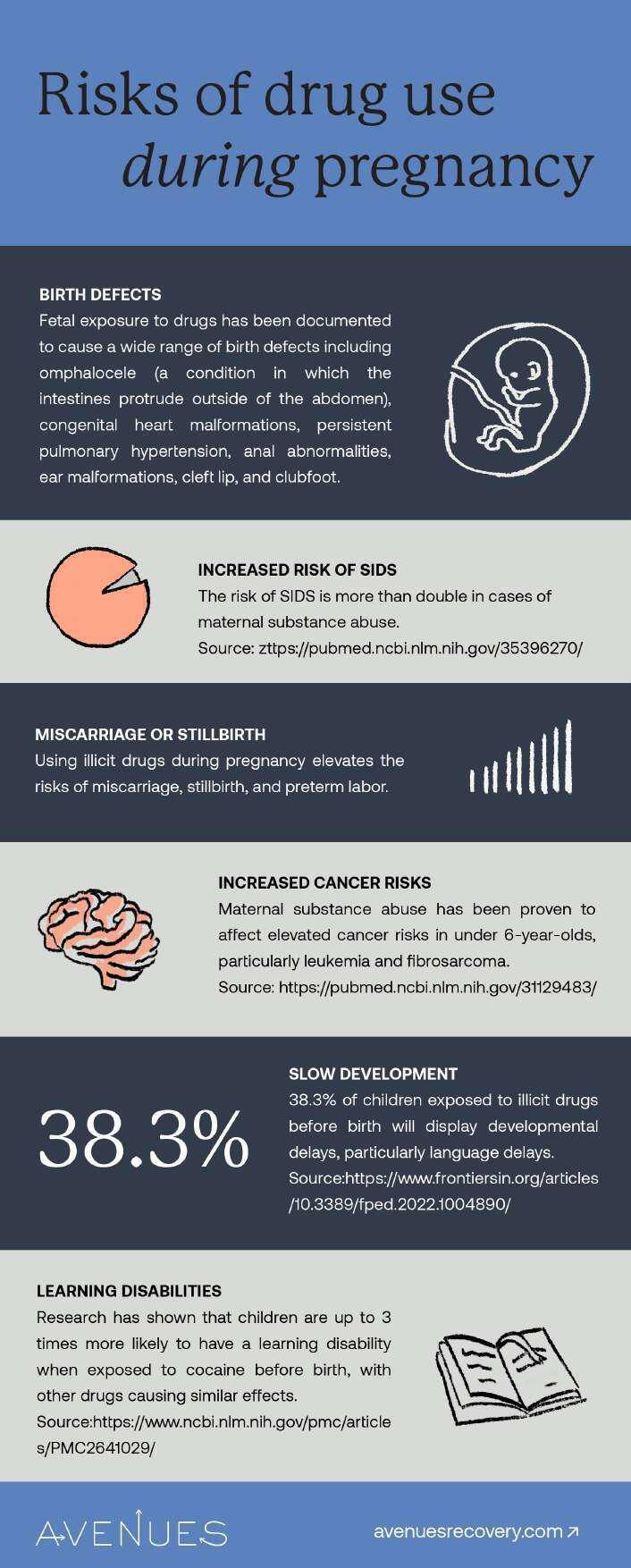Most women are familiar with the warning label on medication boxes and bottles of alcohol. Pregnant women are precautioned to abstain or limit their use of these substances during pregnancy because of the severe risks involved. Another life is of concern, and therefore substance addiction becomes an even more serious matter.
The staff at Avenues Recovery have years of combined experience working with addicts who are pregnant. In this article, we’ll explore the dangers of drug use during pregnancy, what drugs can cause miscarriages, and we’ll share the statistics of pregnancy and drug abuse.
What Are The Dangers of Drug Use During Pregnancy?
During pregnancy, the fetus is nourished from the placenta; an organ developed in the walls of the uterus and connected to the baby’s umbilical cord. Oxygen and nutrients in the mother’s bloodstream pass from the mother to the baby’s bloodstream through the placenta and help the fetus to develop. Along with the necessary nutrients that are delivered to the fetus, harmful substances that are absorbed into the blood can cross the placenta as well, entering the baby’s blood vessels and causing serious ramifications.
The risks associated with in-utero drug exposure depend on several factors. Obviously, how large the dose and how strong the drug is will play a large role in how the fetus will be affected. There will also be different consequences depending on the stage of the fetus’s development.
Early Stages - Drug Use During First 3 Weeks of Pregnancy
During the first twenty days after fertilization, the fetus is highly resistant to birth defects, so drugs can have an all-or-nothing effect. Drug use during the first 3 weeks of pregnancy can possibly have no effect or can cause instant death to the baby.

Drug Use During First 6 Weeks of Pregnancy
The beginning weeks of pregnancy are the most crucial to the baby’s development. During these first few weeks, the body structure and organ systems start to form, making the fetus particularly vulnerable to birth defects. If the fetus is exposed to harmful drugs during this period, there can be irreversible, long-term effects.
Effects of illicit drug use during the early stages of pregnancy include:
- Miscarriage
- Birth defects
- Cancer risk
Long-Term Effects of Prenatal Drug Exposure
Unfortunately, the consequences of maternal substance abuse in pregnancy don’t always end at birth. The effects could be long-term and possibly fatal to the newborn baby.
- Birth Defects - Smoking and alcohol abuse can lead to birth defects such as cleft lip, cleft palate, or both.
- SIDS (sudden infant death syndrome) - Prenatal drug exposure increases the risk of SIDS
- Developmental and Cognitive Impairments - The effects of prenatal drug exposure on child development can be significant and long-lasting, impacting cognitive, behavioral, emotional, and physical well-being.

Harmful Drugs During Pregnancy
Ignorance is not always bliss. A pregnant mother has to keep safe during pregnancy and should be aware of the drugs she should stay away from.
High risk drugs include:
- Opiods - Both prescription Opioids and illegal opioids, such as Heroin contribute to the current opioid drug abuse epidemic. Opioid use during pregnancy can lead to various problems for the baby, including low birth weight, premature birth, birth defects, developmental delays, and behavioral problems.
- Cocaine - Crack cocaine exposure in utero can result in long-term physical and cognitive impairments in children. These impairments can significantly impact their academic and social development.
- Marijuana - Research shows that smoking marijuana drugs can double or triple the risks of stillbirth, as well as premature birth and low birth weight.
Regular use of certain drugs can also cause neonatal abstinence syndrome (NAS), in which the baby will display withdrawal symptoms at birth. Just like adults, these symptoms will vary depending on how often the mother used this drug and how her body reacted to it.
Some indications of NAS include:
- Blotchy skin coloring
- Excessive crying
- Fever
- Trembling
Smoking Cigarettes
Exposure to nicotine and other harmful chemicals in cigarette smoke can increase the risk of miscarriage, preterm birth, low birth weight, and birth defects. Additionally, smoking during pregnancy can also lead to complications like placental abruption and preeclampsia.
Caffeine
Consuming excessive caffeine during pregnancy can also have negative effects on both the mother and the baby. While moderate caffeine intake is generally considered safe, excessive consumption has been linked to increased risks of miscarriage, low birth weight, and preterm birth. Pregnant women must limit their caffeine intake or avoid it altogether, especially in the first trimester.
What Drugs Are Safe In Pregnancy?

At times, certain drugs are essential for the health of the pregnant woman and baby. In such cases, a woman should consult with her doctor or healthcare practitioner about the risks and benefits of taking that specific drug. For example, a doctor may often recommend certain vitamins and dietary supplements during pregnancy.
Antidepressants are another commonly used drug during pregnancy, with the newborn baby possibly displaying withdrawal symptoms after birth. To prevent this from happening, doctors try to gradually reduce the dose of the antidepressants during the 3rd trimester and bring it to a complete stop before the delivery date. However, if the mother has significant signs of depression as the dose is reduced, the antidepressants should be continued. Depression during pregnancy can likely lead to postpartum depression, a mood change that can last for months. The loss outweighs the benefits in this case.
Drug Use During Pregnancy Statistics
The National Institute on Drug Abuse estimates that in the United States, 5% of pregnant women have drug or alcohol addictions. With another life to consider and serious implications of her addictive pastime, pregnancy is a common time for a woman to work on addressing her substance addiction.
Treatment For Substance Abuse in Pregnancy
Sudden withdrawal from an addictive substance is not recommended. Based on research, the CDC endorses certain medications for those suffering from OUD (opioid use disorder) due to better outcomes and a reduced risk of relapse.
SAMHSA encourages women with substance abuse disorders to begin treatment with methadone and buprenorphine. Drug treatment centers use these medications to gradually reduce drug cravings and dependence on opioids and heroin, allowing those pregnant on drugs to focus on recovery and care for their babies.
If you are battling an addiction and are either pregnant or hope to become pregnant, our rehab programs are ready and equipped to give you the full support that you need at this time. Avenues Recovery recognizes the unique situation that pregnancy places you in, and we’re here to help you through it. Reach out to Avenues Recovery to get help for drug use during pregnancy, some rewards come in small forms - like tiny, healthy bundles of joy.



